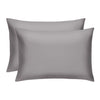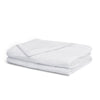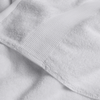The Daily Miracle
How To Wash Linen: Linen Care Guide
Published
February 11, 2025
Author
John Tsenekos

Linen is a timeless fabric, cherished for its natural elegance, durability, and breathability. Whether it's your favorite summer dress or those luxurious bed sheets, linen adds a touch of sophistication to your life.
However, to keep your linen looking and feeling its best, proper care is essential. This guide will walk you through everything you need to know about washing linen, ensuring your cherished pieces remain vibrant and long-lasting.
Everything To Know About Linen Fabric
Linen is derived from the flax plant, making it a natural and eco-friendly fabric. It's known for its strength and durability, often outlasting other materials. Linen has a distinct texture, with a slightly crisp feel that softens beautifully over time. Its natural fibers allow for excellent breathability, making it ideal for warm weather. Additionally, linen is highly absorbent and quick-drying, which contributes to its comfort and practicality.
The benefits of linen extend beyond its aesthetic appeal. Its breathability ensures you stay cool and comfortable, even on the hottest days. Linen's hypoallergenic properties make it a great choice for those with sensitive skin. Furthermore, linen is resistant to dirt and stains, which means it requires less frequent washing.
Linen's versatility makes it a popular choice for a variety of applications. In fashion, linen is used for everything from lightweight summer dresses to tailored suits. In the home, linen is a favorite for bed linens, tableware, tablecloths, and curtains, adding a touch of elegance and comfort. Its durability and natural beauty make linen an excellent choice for both casual and formal settings, seamlessly blending style with functionality.
Preparing Linen for Washing
Before you begin, always check the care labels on your linen items. These labels provide essential information about washing techniques and temperatures, drying methods, and any specific instructions to follow. Adhering to these guidelines helps preserve the fabric's integrity and appearance.
Sorting Linen by Color and Type
To prevent color bleeding and ensure a thorough clean, sort your linen by color and type. Separate whites from colors and delicate items from heavier fabrics. This simple step helps maintain the vibrancy of your linen and prevents damage during the wash cycle.
Pre-Treating Stains and Spots
Address any stains or spots before washing. Use a gentle stain remover or a small amount of Miracle Detergent directly on the affected area (we recommend you tear off a portion of the sheet equivalent to the size of the stain).
Allow it to sit for a few minutes before washing. This pre-treatment helps lift stubborn stains, ensuring your linen comes out looking fresh and spotless.
How To Wash Linen
Choose the Right Detergent
Being selective about detergent types is crucial for maintaining the quality of your linen. We recommend Miracle Detergent, which offers a powerful yet gentle clean. These detergent sheets are formulated with all-natural, hypoallergenic ingredients, making them safe for both your skin and the environment. They dissolve quickly in both hot and cold water, providing thorough fabric cleaning without leaving residue. Plus, their biodegradable packaging means you’re making an eco-friendly choice, reducing plastic waste and carbon emissions.
For a medium load, toss one sheet directly into your washer with the linen garments. For a larger load, toss in two sheets. It's that easy.
Select the Appropriate Water Temperature
Linen is best washed in lukewarm water to maintain its strength and prevent shrinkage. Avoid hot water, as it can weaken the fibers and cause the fabric to lose its shape. Cold water can be used for lightly soiled items or to preserve the color of dyed linens.
Machine Washing vs. Hand Washing
Linen can be washed in a machine or by hand, depending on the item's delicacy and your preference. For machine washing, use a gentle cycle to minimize agitation. If you choose to hand wash, gently swish the linen in soapy water without wringing or twisting, which can damage the fibers.
Tips for Maintaining Linen’s Natural Texture and Color
To keep your linen looking its best, avoid overloading the washing machine, which can cause excessive friction. Use a gentle detergent like Miracle to enhance the fabric's longevity and maintain its natural texture. Additionally, consider using a mesh laundry bag for delicate items to provide extra protection during the wash cycle.
Drying Linen
Drying linen correctly will help preserve its quality and prevent damage. The best practice is to air dry your linen whenever possible. Hang your items on a clothesline or lay them flat on a clean surface to maintain their shape and prevent wrinkles. If you prefer using a dryer, opt for a low heat setting to minimize the risk of shrinkage. Remove the linen while it's still slightly damp to reduce creasing and make ironing easier.
Ironing and Storing Linen
When ironing, do so while the fabric is still slightly damp, using a medium-hot iron setting. This helps smooth out wrinkles without damaging the fibers.
For storage, fold your linen neatly and place it in a cool, dry area away from direct sunlight to prevent fading. Use breathable storage bags or cotton pillowcases to protect your linen from dust while allowing air circulation. To prevent mildew and odors, ensure your linen is completely dry before storing and occasionally air it out.
Conclusion
Caring for your linen properly ensures its longevity and timeless appeal, and how to wash linen is easier than you may think. Just choose a mild detergent, wash with care, lean toward air drying, and store your garment correctly, and you can maintain the fabric's natural beauty and durability. A little attention goes a long way in preserving the quality of your cherished linen pieces!
Sources:

















